

B2 First (FCE) Essay Writing Guide
The Cambridge B2 First (FCE) essay is easier to write than you think! Follow these steps to write the perfect essay.
Post Contents
What is the Cambridge B2 First Essay?
- Part 1 of the writing test – there are 2 parts total
- 140-190 word limit
- You have about 40 minutes to plan and write your essay
- You must answer a question using two notes and your own idea
- The topic requires general knowledge only
- The essay is always formal because it is written “for your teacher”
Step One: Look at the Task (1 minute)
To begin, all B2 First essays have a similar format . This is great because you know exactly how to write the essay before seeing the question.
Read the essay question carefully and HIGHLIGHT any keywords you need to write about.
Tip: If you don’t understand the question or notes, DON’T PANIC. Try your best to write the essay. You will still get points for grammar, vocabulary, and structure.

Sample exam test from Cambridge English .
Step Two: Write a plan (5 minutes)
A lot of my students dislike writing a plan. However, a plan helps you organize your thoughts and helps you write a better B2 First essay. Your essay needs 5 paragraphs . We will use the sample task from above as an example:
Paragraph structure for an essay
Introduction.
- Rivers and seas
- Your own idea
Next, to create a plan, write a few words for each paragraph . DO NOT write whole sentences. This takes too much time. Try to focus on keywords and short phrases .
Tip: “Your own idea” DOES NOT mean your opinion. You need to think of another topic related to the question to talk about. Some ideas for this task could be: recycling, agriculture, industry, etc.
Additionally, you can prepare a list of linking words and related vocabulary . Getting these words written down before you start helps you remember to use them.
Look at the example plan below. You can draw something similar on a blank piece of paper.
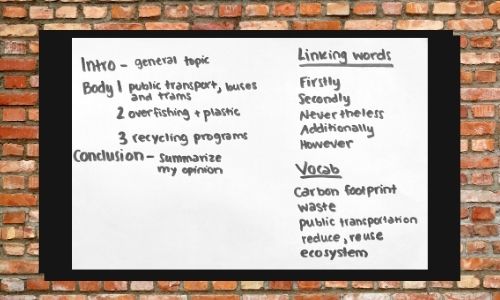
Tip: Time yourself – see how long it takes for you to write a plan. Try to reduce that amount of time as much as possible.
Step 3: Write your essay (32 minutes)
On the official test, you must write with a pen . No erasable pens or pencils are allowed. I suggest writing your plan and essay with a pen every time you practice .
Let’s take a look at each paragraph of the essay.
The introduction to your essay should be 2-3 sentences long . It introduces the essay topic in a general way .
Tip: DO NOT include your opinion in the introduction. Your opinion goes in the conclusion.
If you are unsure how to write an introduction, try this structure and look at the example :
Structure of the introduction
- 1 sentence about the topic in general
- 1-2 sentences about the topic more specifically, including a question if you like.
Example Introduction
On every continent, the amount of trash and waste is increasing each year. Rubbish causes damage to ecosystems all over the world. Is there a way for countries to reduce their carbon footprint and save our planet?
Body of the essay
The body of the essay has three paragraphs . These paragraphs talk about one idea with supporting examples .
For each paragraph, you need to write a topic sentence. A topic sentence is the main idea of the paragraph . DO NOT copy the notes. Instead, try to rewrite the idea in your own words. This is called “paraphrasing.”
Your paragraphs should be 3-4 sentences .
Tip: Start each paragraph with a linking word .
Structure of a body paragraph
- Linking word and topic sentence
- Supporting sentences
Example body paragraph
Firstly, countries can decrease pollution and environmental stress by offering more public transportation. Cars and other vehicles which require petrol produce toxic fumes. If more electric buses and trams were available, fewer people would need to drive their cars.
Follow the same structure for each body paragraph.
Tip: Remember that “your own idea” is NOT your opinion . Write about an additional topic related to the question that you wrote down on your plan.
Finally, you get to say your opinion! In the conclusion, you need to summarize the topic and give your opinion on the question. A conclusion should be 1-2 sentences long.
Structure of the conclusion
- Transition word and a sentence summarizing the topic
- A sentence that gives your opinion
Example conclusion
To sum up, countries around the world must make changes in order to protect the environment. In my opinion, offering more public transport, reducing overfishing, and creating recycling programs are necessary for a cleaner planet.
Step Four: Review your writing (2 minutes)
This is another important step that students often miss. Take two minutes after writing your essay to check for spelling and grammatical errors.
Since you wrote in pen, simply cross out the incorrect word or words LIKE THIS and rewrite them.
How can I get a higher mark on the FCE essay?
Now that you know how to write an essay for the Cambridge B2 First exam, let’s look at how to get the best mark possible .
Increase your mark on your B2 First essay
- Include 5-8 linking words – these words introduce paragraphs and connect ideas
- Use a variety of grammatical structures – you should have both simple and complex forms. Try to use perfect and future forms, conditionals, comparatives, relative clauses and passive
- Use formal vocabulary – do not use slang or simple words like “good, big, small, bad.” Also, do not use contractions. Write “cannot” instead of “can’t”
- Make the essay interesting to read – the examiners read hundreds of essays so make yours easy to read and engaging
- Use the correct amount of words (140-190) – it’s ok to be a few words over the limit, but not too many
Final Advice
The best way to improve your writing skills … is to write! Try to write a few essays each week and ask your teacher for feedback . I have had students who entered my class with very poor writing skills and with practice, they were able to pass the exam after only 10 weeks!
I help students prepare for the FCE exam with private lessons via Zoom. Email me at [email protected] or check out my private lessons page to learn more.
If you want more practice for the B2 First , try these Speaking exam tips , free writing checklist , and Reading part 1 practice.
ESL Teacher 365 Online Courses & Memberships
Teach online in 10 days mini-course.
A step-by-step 10 lesson mini-course that will teach you how to become an online teacher so that you can life a life of freedom & flexibility - with unlimited income potential!
TEFL Teacher Roadmap Teach Course
A proven step-by-step formula that will teach you how to move abroad with confidence & clarity. A self-study online course for anyone asking "NOW WHAT?!" after completiting their TEFL certificate.
Teach Abroad Club Membership
Ready to start your teach abroad adventure? Teach Abroad Club is the ONLY monthly membership & community that supports you through the teach abroad process - every step of the way.
Follow ESL Teacher 365
More posts from the blog.

8 Things You Should Look for in an International Teaching Contract
Jan 23, 2024
What should you look for when it comes to international teaching contracts? Find out in this guest post by Christopher Jacklin.

Effective Feedback in the ESL Classroom: Key Strategies for Success
Oct 12, 2023
Strategies for Feedback in the ESL Classroom – a guest post by RVF International.

Teach Abroad in China 2024
Oct 6, 2023
How to teach English abroad in China – a complete guide to visas, types of schools, salaries and benefits of teaching in China.

Thanks for visiting ESL Teacher 365!
Certified Teacher & Founder of ESL Teacher 365
I am passionate about helping people teach abroad & online so they can live a life of adventure !
I’ve taught in 6 different countries and love sharing my teach abroad (and online) tips and tricks.
The world is yours to teach and explore!
– Jamie
Disclaimer: ESL Teacher 365 participates in Amazon Associates and other afilliate programs. This means I may earn a small commission if you use one of my links, at no extra cost to you. This helps me continue to provide helpful resources for teachers. Thank you!

Exam English ✓
- B2 First (FCE)
- Reading & Use of English
- Cambridge exams
Free Practice Tests for learners of English
Cambridge english: b2 first (fce) writing.
Difficulty level : B2 /Upper Intermediate
What is the B2 First (FCE) Writing test like? The test has two sections and takes about 80 minutes:
- Part 1 - write an essay based on prompts
- Part 2 - write one from a choice of 3 questions: an article , an essay , a letter, a report , a review , a story
Scoring Each of the two writing parts are marked out of 20. There are five marks for each of the following: Content, Communicative Achievement, Organisation and Language. You must write 140-190 words for each part.
How to prepare for the B2 First (FCE) Writing test
- Choose a question that you are interested in. You will write better if you know the subject.
- Read the instructions carefully before you start. Make notes. You must include all the points from the instructions in your writing .
- Make a plan before you start writing. Decide what information to put in each paragraph.
- Think about who you are writing to and use an appropriate style of language.
- Try to use a range of complex language.
Read this explanation of how to write an article for FCE Writing part 2.
First (FCE) Writing tests
- Writing part 1 (essay)
- Writing part 2 (review)
- Writing part 2 (article)
- Writing part 2 (email)
- Writing part 2 (report)
- How to write an article
- Writing essay introductions
- Brainstorming ideas for essays
- Answer the question!
First (FCE) Sections
- Cambridge First (FCE)
2021 © Exam English Ltd. ALL Rights Reserved. Home | Terms of Use | Privacy policy Cookie preferences. -->
- B1 Preliminary (PET)
- B2 First (FCE)
- C1 Advanced (CAE)
- C2 Proficient (CPE)
Not a member yet?
- Part 1 0 / 30
- Part 5 0 / 25
- Part 6 0 / 25
- Part 7 0 / 20
- Part 2 0 / 30
- Part 3 0 / 30
- Part 4 0 / 20
- Part 1 NEW 0 / 25
- Part 2 NEW 0 / 25
- Part 3 NEW 0 / 25
- Part 4 NEW 0 / 25
- Part 1 0 / 25
- Part 2 0 / 25
- Part 1 0 / 10
- Part 2 0 / 10
- Part 3 0 / 10
- Part 4 0 / 10
Get unlimited access from as little as 2.60 € / per month. *One-time payment, no subscription.
Your teacher has asked you to write an essay on the dangers of social media, and how people can protect themselves.
Your teacher has asked you to write an essay on the importance of learning foreign languages.
- New account
Login into your account...
Not a memeber yet? Create an account.
Lost your password? Please enter your email address. You will receive mail with link to set new password.
Back to login
Breakout English

First (FCE)
Breakout English has a number of First (FCE) materials for you to use in class or at home to prepare for the Cambridge B2 exam. The Cambridge First exam is a big step up from B1 level exams. At B2, Cambridge introduces the Use of English section while also increasing the challenge of several other task types in the Reading, Writing, Listening and Speaking papers.

Fun writing activity: The consequences game

First (FCE) B2 Key Word Transformations – Relative Clauses

Uses of punctuation marks – Writing well-structured sentences

250 First (FCE) Key Word Transformations B2

First (FCE) B2 Key Word Transformations – Comparatives and Superlatives Exercises

First (FCE) Speaking Part 3 Examples

Dependent prepositions exercises – Use of English part 2

Word Formation Exercises – Conversation Questions

How to write a report

First (FCE) Speaking Part 3 Useful Phrases

How to do First (FCE) Reading Part 6 – Gapped text

Christmas Find Someone Who – Open cloze

B2 First (FCE) Writing Part 1 – Improve an Essay

First (FCE) B2 Key Word Transformations – Phrasal Verbs

Informal vs formal letters and emails

How to write a film review

Just a Minute Topics

Gerunds and Infinitives List

Christmas Speaking Activities

The best First Certificate books

IELTS Academic Writing Part 1 – Describing change and surveys

First (FCE) Essay Questions

First (FCE) Speaking Part 2 Pictures

First (FCE) Song – Fast Car – Tracy Chapman

Christmas Songs Listening

The 120 most useful phrasal verbs list

First (FCE) B2 Key Word Transformations – Conditionals

Linking words – How to improve your writing

Writing an Article – Rhetorical Questions

First day get to know you questions

First (FCE) Speaking – Sample Tests

First (FCE) Song – Shallow – Lady Gaga, Bradley Cooper

How to do First (FCE) Use of English Part 2 “Open Cloze”

Word Formation Games

How to teach Cambridge exam classes

Wishes and Regrets

How to do First (FCE) Speaking Part 2 – Useful Phrases

Expressing Preferences – Would you rather…

Agree / Disagree Language – The Environment

Cambridge Speaking Part 1 – Chat Cards

First (FCE) B2 Key Word Transformations – Reporting Verbs Exercise

First day of exam class – Get to know the exam (Cambridge)
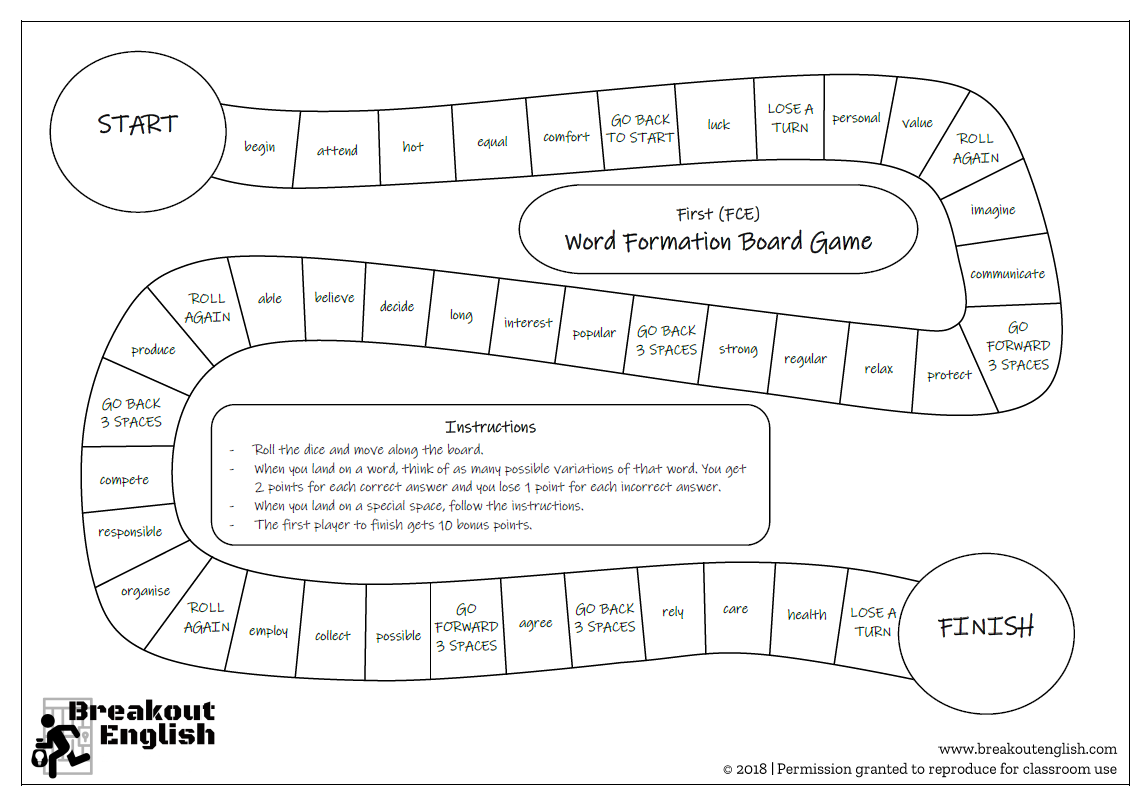
First (FCE) Word Formation Board Game
No post found
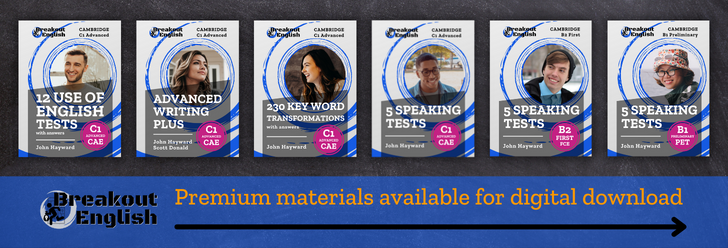
How to prepare for First (FCE)
In order to demonstrate a B2 level, Cambridge First (FCE) challenges candidates to produce complex language and deal with complex topics. It will be necessary to have a solid grasp of less frequent vocabulary, such as phrasal verbs, as well as a strong knowledge of the way language is linked together to form a variety of writing texts and spoken discourse.
By the time someone has passed the Cambridge B2 exam, you can be sure that they are able to communicate effectively in any everyday situation and quite possibly be able to handle more difficult or abstract topics as well. It’s a strong level, which anyone who achieves it should be considered to have better than average English.
Here are some things you can do to prepare for the exam:
- Start reading and listening to more English – You should be able to handle a lot of texts and listenings in English and practice makes perfect. It will build your vocabulary and help your pronunciation too. Try something like TED-Ed videos, which are short and thought-provoking.
- Study vocabulary – You will need to know phrasal verbs and linking words as well as dealing with topics like the environment and education. Studying vocabulary for these topics will help in all parts of the exam.
- Learn complex grammar – To show your level of English at B2 level, you want to use grammar like the passive voice, conditionals and reporting verbs well. These grammar areas will help to prove you are worthy of the level.
- Write – Writing is an important part of the exam and you will need to feel comfortable writing essays, letters/emails, articles, reviews and reports. This also means understanding the difference between formal and informal writing.
- Take a class – The First Certificate exam isn’t easy. Having a teacher and peers supporting your progress and providing motivation makes a huge difference.
- Do practice exams – You can get books of practice exams which will help you feel familiar with the format and improve your test-taking skills.
Enjoy the First (FCE) materials!
More Cambridge materials


- How to Write a Great Article in the Cambridge B2 First Exam

- Posted on 11/12/2019
- Categories: Blog
- Tags: B2 First , Cambridge Exams , Writing
Writing in your only language can be a challenge, but writing in another language can be a complete nightmare ! Where do you even begin?
If you are taking your Cambridge B2 First exam you’ll have to write two texts in an 80-minute period. In part 1 you must write an essay but in part 2 you will be able to choose between a number of options. This could be could be an email, a letter, a report, a review or an article.
Read more about the format of the Cambridge B2 First exam .
In this writing guide, we’ll focus on how to write an article for the Cambridge B2 First Writing paper – part 2. We’ll also share with you some tricks and tips for passing this part of the exam. You’ll learn how to plan your article, structure it, use rhetorical questions , exclamation marks – and lots more. By the end, you’ll have the confidence to write an amazing article in English!
What is an article and how do you write one for the B2 First?
You’ll find lots of examples of articles in magazines, newspapers and internet blogs. In these texts, writers share information, guides and opinions on specific topics. The idea is to write in a way that grabs the reader’s attention and keeps them interested until the very end.
In the Cambridge B2 First Writing Paper – part 2, you could be asked to write about a variety of topics. However, it’s often something you’ve recently learned to do or know a lot about. For example, the question might be about a concert you’ve been to recently, you favourite hobby or your hometown.
Here’s an example of a B2 First article question.
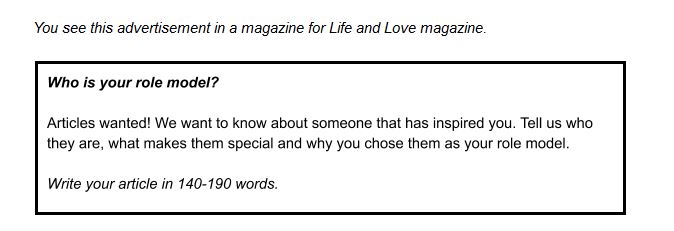
Now let’s look at how to get started!
How to write an article in three simple steps
You’ve got the question in front of you, so now it’s time to start writing your article, right?
Wrong! If you do that, you’ve missed an essential stage: planning.
You can compare writing an article to preparing your favourite meal. No good tortilla de patatas was ever made without carefully preparing the ingredients first. It’s exactly the same with your writing – only, you’ll need fewer onions. Time management is also important. You only have about 40 minutes total so you need to plan your time carefully.
Here’s how to do it:
Step 1: Make a plan (10 minutes)
Think about the question.
Really focus on the question. Decide who your role model is. Is he or she a sporting hero you really admire? Or someone closer to home? It could be a family member that you look up to or a person in the community who’s done something amazing. Think about why they inspire you and make some notes on your ideas.
Think about the tone
Consider the best blogs you read on the internet. Are they relaxed and friendly? Or do they sound like boring school essays? The truth is most articles are quite conversational. They are somewhere between semi-formal and informal. They are often informative, whilst entertaining and engaging the reader. You can also try to add some humour in too!
Think about the structure
Structuring your article is key and there’s normally more than one way to do it. Decide which structure makes sense for the question. Try to keep it logical and include different ideas in different paragraphs.
Here’s an example structure:
- Paragraph 1 Introduction Start with a catchy opening line to hook the readers. Then introduce your role model.
- Paragraph 2 – Describe what makes them special Giving examples and developing your answer.
- Paragraph 3 – Why you chose them as your role model This should be like a conclusion and give the reader a lasting comment or a question to think about.
Note: For many articles four paragraphs will be more appropriate – it depends on the question you are given.
Linkers are a fantastic way to organise your ideas. Experiment with some of these in your next article:
For a start…
Not to mention…
On top of that…
*Remember, you don’t need headings or titles in the article it should read as one continuous piece of work.
Think about vocabulary
Brainstorming vocabulary is a great way to get your ideas flowing . What are some great words related to the topic? List some adjectives for being a good role model. Pick out some verbs related to motivation or any good nouns or collocations you think would work. Throw some phrasal verbs and idioms in there too!
Here’s an example for the question above:
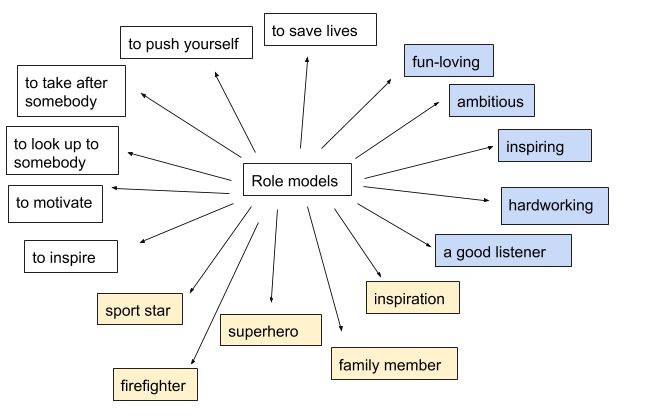
Think about ways to personalise your writing
Articles tend to have a personal touch. You can be a lot more familiar with the reader addressing them personally with pronouns like ‘you’ and ‘I’. Give your own opinion and also use contractions. Here are some more ways to sound personal:
Have you ever wondered…?
I’m sure you can imagine…
Can you believe…?
I will never forget…
There’s nothing more amazing than…
If you ask me…
Step Two: Write it (25 minutes)
An interesting introduction is the key to a first-rate article. You want to capture your audience’s attention whilst making it clear what it’s going to be about. Start with an opening line that sets the tone of the topic. Try to catch the attention from the first word. Here’s an example:
Firefighters and superheroes are obvious role models. But sometimes the person that inspires us the most is so much closer to home. I have never had a favourite singer or sports star but my father has always been an important inspiration for me.
Next, think about the original question. What makes your role model special? Remember to keep it interesting and include some personal feelings. Use exclamation marks like this:
One of the things that makes my father so special is that he always does everything for his family, and he’s an excellent listener too. Whenever we have a problem he’s always there for us. Not to mention the fact that he’s also really fun-loving! If there’s a party, my dad is the first person on the dancefloor.
But only include one or two exclamation marks in the article or they’ll lose their impact.
Finally you want to tackle the last question. Why did you choose him as your role model? A great technique here would be to address your reader personally and even include a rhetorical question at the end. This gives them something to think about. A little bit like this:
I think my father is the best role model because he is the most hardworking person I know. He has a really difficult job as a doctor and is always saving lives. That’s so inspiring for me!
I really look up to him and he really pushes me to be the best I can be. Wouldn’t you want a role model like my dad?
Step Three: Check it (5 minutes)
Everything has come together and you’ve got your final article. Now you can sit back, relax and put your feet up until the examiner says stop. Wait, not quite!
You’re missing the last important step. Always check your writing. You’d hate for all your hard work to be wasted at the last moment. Here are some things to check for.
- You included everything in the question
- You’ve used a variety of sentence lengths
- The spelling is correct
- It’s personal and engaging
- You haven’t repeated the same vocabulary too often
- It’s not too formal
What are the examiners looking out for?
To get the very best results, you need to know what the examiners are looking out for when they are marking your writing.
These are the four most important things to consider:

Ask yourself these questions when checking your work and make any necessary changes before the time is up!
Any other advice for writing an article?
Read, read, read. Go online and search for blogs in English that interest you. If you love sports, look at the sports news. If you prefer fashion, find fashion articles. Whatever it is read real examples for real inspiration!
If you’re still not confident about writing in English, or you want some help preparing for the B2 First exam, take a look at our exam courses .
You can also check out our articles on how to write an Essay or a Review in the Cambridge B2 First.
Glossary for Language Learners
Find the following words in the article and then write down any new ones you didn’t know.
Nightmare (n): : a bad dream.
Rhetorical question (n): a question that doesn’t need to be answered, for dramatic effect.
Time management (n): the way to use your time effectively.
Look up to somebody (pv) : to admire someone.
Humour (n): something amusing or funny.
To hook (v): to attract and captivate your attention.
To flow (v): to move steadily and constantly.
First-rate (adj): excellent, top quality, well made or done.
An exclamation mark (n): this punctuation symbol: !.
To tackle (v): dealing with a challenge or something difficult.
To put your feet up (exp): to rest and relax.
pv = phrasal verb
adj = adjective
exp = expression
Leave a Reply
Name (required)
Email (required)
A Black Friday Guide to Shopping in English
- By: oxfordadmin
- Posted on 26/11/2019
Telephone Interviews In English, Advice And Tips For Success
- Posted on 19/12/2019
Related Post

Exploring the Impact of AI in
Gone are the days of learning from phrasebooks and filling in worksheets for homework. Now students have access to a wid... Read More

Everything You Need To Know Ab
Although you learn plural nouns early on, they can be challenging. There are many rules and exceptions to remember plus ... Read More

The Importance of English For
No matter where you live, you’ve probably experienced record-breaking temperatures and severe weather. You may have se... Read More

Discovering Barcelona Through
We all know that Barcelona is a fantastic city to live in. You only need to spend the afternoon wandering around one of ... Read More

8 New Words To Improve Your Vo
The arrival of a new year presents an ideal opportunity to work on your language goals. Whether you’re preparing for a... Read More

Learning English through Chris
It’s beginning to look a lot like Christmas! If you resisted the urge to sing that line instead of saying it, then, we... Read More

24 Christmas Phrases for Joyfu
‘Tis the season to be jolly, and what better way to get ready for the festive period than by learning some typical Chr... Read More

3 Easy Ways To Use Music To Im
Are you ready to embark on your latest journey towards mastering the English language? We all know that music is there f... Read More

Grammar Guide – Understandin
Do you sometimes feel a bit lost when deciding which tense to use? Are you a little unsure of the differences between th... Read More

Halloween Humour: Jokes, Puns
We all need a break from time to time. Sometimes we’re up to our eyeballs in projects at work, and we just need a mome... Read More

English for Business: 7 Ways L
If you’re interested in getting a promotion at work, earning a higher salary or landing your dream job, then working o... Read More

A Beginner’s Guide to Ch
Understanding the need for exams An official exam is a fantastic way to demonstrate your English. Why? Firstly,... Read More

English Tongue Twisters to Imp
One of the most fun ways to practise and improve your pronunciation is with tongue twisters. That’s because they’re ... Read More

25 years of Oxford House – O
We all know that fantastic feeling we have after completing an academic year: nine months of English classes, often twic... Read More

Guide to the Cambridge C2 Prof
Are you working towards the Cambridge C2 Proficiency (CPE) exam? Have you been having sleepless nights thinking about wh... Read More

9 Tips For Communicating With
When travelling to or living in an English-speaking country, getting to know the local people can greatly enhance your e... Read More

Are you preparing for the Cambridge C2 Proficiency (CPE) writing exam? If those pre-exam jitters have started to appear,... Read More

English Vocabulary For Getting
Are you feeling bored of the way your hair looks? Perhaps it’s time for a new you. All you need to do is make an appoi... Read More

5 Spelling Rules For Comparati
Messi or Ronaldo? Pizza or sushi? Going to the cinema or bingeing on a series at home? A beach holiday or a walking trip... Read More

Are you preparing for the Cambridge C2 Proficiency (CPE) writing exam? If so, you may be feeling a little nervous and co... Read More

Improve your English pronuncia
What are some of the trickiest words to pronounce in English? Well, we’ve compiled a useful list of ten of the most di... Read More

Using Language Reactor To Lear
If you love watching Netflix series and videos on YouTube to learn English, then you need to download the Language React... Read More

Are you preparing for the Cambridge C2 Proficiency (CPE) exam? Would you like to know some tips to help you feel more at... Read More

How to use ChatGPT to practise
Are you on the lookout for an extra way to practise your English? Do you wish you had an expert available at 2 a.m. that... Read More

Well done. You’ve been moving along your English language journey for some time now. You remember the days of telling ... Read More

Tips for the IELTS listening s
Are you preparing for the IELTS exam and need some help with the listening section? If so, then you’ll know that the l... Read More

7 new English words to improve
A new year is a perfect opportunity to focus on your language goals. Maybe you are working towards an official exam. Per... Read More

How to Write a C1 Advanced Ema
Did you know that there are two parts to the C1 Advanced Writing exam? Part 1 is always a mandatory . Part 2 has ... Read More

5 Interesting Christmas tradit
When you think of the word Christmas, what springs to mind? For most people, it will be words like home, family and trad... Read More

How to write a C1 Advanced Rep
Are you preparing for the Cambridge C1 Advanced exam and need a hand with writing your report/proposal for Part 2 of the... Read More

5 of the best apps to improve
Would you like to improve your English listening skills? With all the technology that we have at our fingertips nowadays... Read More

Tips for the IELTS Reading sec
Looking for some tips to get a high band score in the IELTS Academic Reading exam? If so, then you’re in the right pla... Read More

The 5 best Halloween movies to
Boo! Are you a fan of Halloween? It’s that scary time of year again when the creepy creatures come out to play, and th... Read More

How to Write a Review for Camb
Are you planning to take the Cambridge C1 Advanced (CAE) exam? If so, you will need to complete two pieces of writin... Read More

How To Use Relative Pronouns i
Today we’re taking a look at some English grammar that sometimes trips up language learners. In fact, we’ve just use... Read More

How To Get Top Marks: Cambridg
So you’re taking the ? If so, you’ll know that you have four sections to prepare for: speaking, reading and use of E... Read More

Travel Vocabulary To Get Your
Summer is here and we can’t wait to go on our summer holidays! If you’re thinking about travelling overseas this yea... Read More

How To Get A High Score In The
So you’re preparing for the ! From wanting to live and work abroad to going to university in an English-speaking count... Read More

10 English Idioms To Take To T
Is there anything better than cooling off in the sea on a hot summer’s day? Well, if you live in Barcelona you hav... Read More

Tips for IELTS speaking sectio
Are you preparing for the IELTS test? If so, you’ll need to do the speaking section. While many people find speaking t... Read More

How to use 6 different English
Just when you think English couldn’t get any more confusing, we introduce you to English pronouns! The reason why peop... Read More

How to get top marks: B2 First
Congratulations – you’ve made it to the B2 First Reading and Use of English Part 7! Yet, before we get too excited, ... Read More

5 Of The Best Apps For Improvi
Speaking is often thought to be the hardest skill to master when learning English. What’s more, there are hundreds of ... Read More

Do you like putting together puzzles? If so, your problem solving skills can actually help you with B2 First Reading and... Read More

8 Vocabulary Mistakes Spanish
If you ask a Spanish speaker what they find difficult about English language learning, they may mention false friends an... Read More

How To Get Top Marks: B2 First
Picture this: You’re in your B2 First exam and you’ve finished the Use of English part. You can put it behind you fo... Read More

12 Business Phrasal Verbs to K
Want to improve your English for professional reasons? You’re in the right place. When working in English, it’s comm... Read More

How to use articles (a, an, th
Knowing what articles are and when to use them in English can be difficult for language learners to pick up. Especially ... Read More

Are you preparing for ? Reading and Use of English Part 4 may not be your cup of tea – in fact most students feel quit... Read More

Passing B2 First Part 3: Readi
Are you studying for the B2 First exam? You’re in the right place! In this series of blogs we want to show you al... Read More

8 new English words you need f
New words spring up each year! They often come from popular culture, social and political issues, and innovations in tec... Read More

7 of the Best Apps for Learnin
If you find yourself commuting often and spending a lot of time on the bus, you’ll most likely turn towards playing ga... Read More

The B2 First is one of the most popular English exams for students of English. It is a recognised qualification that can... Read More

4 Different Types Of Modal Ver
What are modal verbs? They are not quite the same as regular verbs such as play, walk and swim. Modal verbs are a type o... Read More

So you’ve decided to take the ! Formerly known as FCE or the First Certificate, this is by far most popular exam. Whe... Read More

Useful Expressions For Negotia
A lot of our global business is conducted in English. So, there’s a strong chance you may have to learn how to negotia... Read More

Passing C1 Advanced Part 8: Re
If you’re wondering how to do Part 8 of the Reading and Use of English paper, you’re in the right place! After s... Read More

The Difference Between IELTS G
You’ve probably heard of . It’s the world’s leading test for study, work and migration after all. And as the world... Read More

Passing C1 Advanced Part 7: Re
Welcome to Part 7 of the Reading and Use of English paper. This task is a bit like a jigsaw puzzle. One where you have ... Read More

The Benefits Of Learning Engli
Who said learning English was just for the young? You're never too old to learn something new. There are plenty of benef... Read More

So, you’re preparing to take the . You’ve been studying for each of the four sections; reading, writing, speaking an... Read More

6 Reels Accounts to Learn Engl
Are you looking for ways to learn English during the summer holidays? We’ve got you covered – Instagram Reels is a n... Read More

Passing Cambridge C1 Advanced
Well done you! You’ve made it to Part 6 of the Reading and Use of English exam. Not long to go now – just three mor... Read More

8 Resources To Help Beginner E
Learning a new language is hard, but fun. If you are learning English but need some help, our monthly course is what y... Read More

5 Famous Speeches To Help you
Everyone likes listening to inspiring speeches. Gifted speakers have a way of making people want to listen and take acti... Read More

How To Write A B2 First Formal
Dear reader… We sincerely hope you enjoyed our previous blog posts about the Writing section of the B2 First. As promi... Read More

4 Conditionals In English And
Conditionals? Is that something you use after shampooing your hair? Not quite. You may have heard your English teacher t... Read More

After racing through the first four parts of the Cambridge English Reading and Use of English paper, you’ve managed t... Read More

7 Of The Best Apps For Learnin
There are roughly 170,000 words in use in the English language. Thankfully, most native English speakers only have a voc... Read More

How to write a B2 First inform
You're probably very familiar with sending emails (and sometimes letters) in your first language. But how about in Engli... Read More

How can I teach my kids Englis
Keep kids’ minds sharp over the Easter holidays with some entertaining, educational activities in English. There are l... Read More

How Roxana went from Beginner
Roxana Milanes is twenty five and from Cuba. She began English classes back in May 2019 at Oxford House, and since then ... Read More

4 Future Tenses In English And
“Your future is whatever you make it, so make it a good one.” - Doc Brown, Back to the future. Just like the and... Read More

10 Business Idioms For The Wor
Business idioms are used throughout the workplace. In meetings, conversations and even whilst making at the coffee mac... Read More

5 Tips For Reading The News In
We spend hours consuming the news. With one click of a button we have access to thousands of news stories all on our pho... Read More


How To Write a Report: Cambrid
Imagine the scene. It’s exam day. You’re nearly at the end of your . You’ve just finished writing Part 1 - , and n... Read More

8 English Words You Need For 2
Back in December 2019, we sat down and attempted to make a list of . No one could have predicted the year that was about... Read More

5 Christmas Movies On Netflix
Christmas movies are one of the best things about the holiday season. They’re fun, they get you in the mood for the ho... Read More

MigraCode: An Inspiring New Pa
Oxford House are extremely proud to announce our partnership with MigraCode - a Barcelona-based charity which trains ref... Read More

The Ultimate Guide To Video Co
The age of telecommunication is well and truly here. Most of our business meetings now take place via video conferencing... Read More

6 Pronunciation Mistakes Spani
One of the biggest challenges for Spanish speakers when learning English is pronunciation. Often it’s a struggle to pr... Read More

6 Ways You Can Learn English w
“Alexa, what exactly are you?” Alexa is a virtual AI assistant owned by Amazon. She is voice-activated - like Sir... Read More

Passing Cambridge C1 Advanced:
Okay, take a deep breath. We’re about to enter the danger zone of the Cambridge exam - Reading and Use of English Par... Read More

What’s new at Oxford House f
Welcome to the new school year! It’s great to have you back. We’d like to remind you that , and classes are all st... Read More

European Languages Day: Where
The 26th of September is . It’s a day to celebrate Europe’s rich linguistic diversity and show the importance of lan... Read More

Back To School: 9 Tips For Lan
It’s the start of a new academic term and new courses are about to begin. This is the perfect opportunity to set your ... Read More

How to Maximise Your Online Co
If there’s one good thing to come out of this year, it’s that learning a language has never been so easy or accessib... Read More

How To Learn English With TikT
Are you bored of Facebook? Tired of Instagram? Don’t feel part of the Twitter generation? Perhaps what you’re lookin... Read More

A Brief Guide To Different Bri
It’s a fact! The UK is obsessed with the way people talk. And with , it’s no surprise why. That’s right, accents a... Read More

Study English This Summer At O
Summer is here! And more than ever, we’re in need of a bit of sunshine. But with travel restrictions still in place, m... Read More

5 Reasons To Learn English Out
As Barcelona and the rest of Spain enters the ‘new normality’, it’s time to plan ahead for the summer. Kids and te... Read More

5 Free Online Resources For Ca
Are you preparing for a Cambridge English qualification? Have you devoured all of your past papers and need some extra e... Read More

6 Different Uses Of The Word �
The word ‘get’ is one of the most common and versatile verbs in English. It can be used in lots of different ways, a... Read More

What Are The 4 Present Tenses
There are three main verb tenses in English - , the present and the future - which each have various forms and uses. Tod... Read More

5 Of The Best Netflix Series T
On average, Netflix subscribers spend streaming their favourite content. With so many binge-worthy series out there, it... Read More

Continue Studying Online At Ox
Due to the ongoing emergency lockdown measures imposed by the Spanish Government . We don’t know when we will be a... Read More

Five Ways To celebrate Sant Jo
The feast of Sant Jordi is one of Barcelona’s most popular and enduring celebrations. Sant Jordi is the patron saint o... Read More

What’s It Like To Study Onli
Educational institutions all over the world have shut their doors. From nurseries to universities, business schools to l... Read More

6 Benefits of Learning English
Whatever your new year’s resolution was this year, it probably didn’t involve staying at home all day. For many of u... Read More

9 Tips For Studying A Language
With the recent outbreak of Covid-19, many of us may have to gather our books and study from home. Schools are clos... Read More

10 Ways To Learn English At Ho
Being stuck inside can make you feel like you’re going crazy. But why not use this time to your advantage, and work on... Read More

Important Information –
Dear students, Due to the recent emergency measures from the Government concerning COVID-19, Oxford House premises wi... Read More

7 Books You Should Read To Imp
Reading is one of the best ways to practice English. It’s fun, relaxing and helps you improve your comprehension skill... Read More

Your Guide To Moving To The US
So that’s it! It’s decided, you’re moving to the USA. It’s time to hike the soaring mountains, listen to country... Read More

How to write a C1 Advanced Ess
The is an excellent qualification to aim for if you’re thinking of studying or working abroad. It’s recognised by u... Read More

Small Talk For Business Englis
Like it or not, small talk is an important part of business. Whether it’s in a lift, at a conference, in a meeting roo... Read More

English Vocabulary For Going O
It’s time for that famous celebration of love and romance - Valentine’s Day! It is inspired by the sad story of Sain... Read More

IELTS: Writing Part 2 –
When it comes to exams, preparation is the key to success - and the IELTS Writing Paper Part 2 is no exception! It is wo... Read More

5 Unmissable Events at Oxford
At Oxford House, we know learning a language extends beyond the classroom. It’s important to practise your skills in m... Read More

Am I ready for the C1 Advanced
Congratulations! You’ve passed your Cambridge B2 First exam. It was a hard road but you did it. Now what’s next? Som... Read More

Ireland is known as the Emerald Isle. When you see its lush green landscape and breathtaking views, it’s easy to see w... Read More

How SMART Goals Can Help You I
New year, new you. As one year ends and another begins, many of us like to set ourselves goals in order to make our live... Read More

15 New English Words You Need
Each year new words enter the English language. Some are added to dictionaries like . Others are old words that are give... Read More

Our Year In Review: Top 10 Blo
2019 went by in a flash - and what a year it’s been! We’re just as excited to be looking back on the past 12 months ... Read More

Telephone Interviews In Englis
Telephone interviews in English can seem scary. Employers often use them to filter-out candidates before the face-to-fa... Read More

A Black Friday Guide to Shoppi
Black Friday is the day after Thanksgiving. Traditionally, it signals the start of the Christmas shopping period. Expect... Read More

Passing C1 Advanced: Part 3 Re
The (CAE) is a high-level qualification, designed to show that candidates are confident and flexible language users who... Read More

AI Translators: The Future Of
Many people believe that artificial intelligence (AI) translators are surpassing human translators in their ability to a... Read More

8 Of The Best Apps For Learnin
Apps are a great tool for learning English. They are quick, easy to access and fun. It’s almost like having a mini cla... Read More

6 Ways To Improve Your Speakin
There are four linguistic skills that you utilise when learning a new language: reading, writing speaking and listening.... Read More

Passing Cambridge C2 Proficien
So, you’ve moved onto Part 3, and after completing Part 2 it’s probably a welcome relief to be given some help with ... Read More

8 Resources To Build Your Busi
Whether it’s in meetings, telephone conversations or networking events, you’ll find specific vocabulary and buzzword... Read More

5 Ways to Become a Better Lear
It’s time for some back-to-school motivation. The new school year is about to start and everyone is feeling refreshed ... Read More

Our 10 Favourite YouTubers To
Haven’t you heard? Nobody is watching the TV anymore - 2019 is the year of the YouTuber! If you’re an English langu... Read More

So, you’ve completed the of your Cambridge C1 Advanced (CAE). Now it’s time to sit back and enjoy the rest of the e... Read More

The Secret French Words Hidden
“The problem with the French is that they have no word for entrepreneur.” This phrase was attributed to George W. B... Read More

The Ultimate Guide To Gràcia
The Gràcia Festival, or , is an annual celebration taking place in the lovely, bohemian neighbourhood of Gràcia in upt... Read More

5 Things To Do In Barcelona In
Barcelona residents will often tell you than nothing happens in August. It’s too hot and everyone escapes to little vi... Read More

4 Past Tenses and When to Use
Do you have difficulty with the past tenses in English? Do you know the difference between the past simple and past perf... Read More

How To Write A Review: Cambrid
Students who are taking their B2 First Certificate exam (FCE) will be asked to do two pieces of writing within an 80 min... Read More

8 Hidden Benefits of Being Bil
Unless you were raised to be bilingual, speaking two languages can require years of study and hard work. Even once you�... Read More

7 Films to Practise Your Engli
What’s better than watching a fantastic, original-language movie in a theatre? Watching a fantastic, original-language... Read More

The 10 Best Instagram Accounts
Ever wonder how much time you spend on your phone a day? According to the latest studies, the average person spends on ... Read More

Challenge Yourself This Summer
Here comes the sun! That’s right, summer is on its way and, for many, that means a chance to take a well-deserved brea... Read More

You’ve done the hard part and finally registered for your , congratulations! Now all you need to do is pass it! H... Read More

These 5 Soft Skills Will Boost
Everyone is talking about soft skills. They are the personal traits that allow you to be mentally elastic, to adapt to n... Read More

Which English Exam Is Right Fo
Are you struggling to decide which English language exam to take? You’re not alone: with so many different options on ... Read More

Passing C2 Proficiency: A Guid
We’re sure you’ve done a great job answering the questions for of your . But now you’re faced with a completely d... Read More

Sant Jordi – Dragons, Bo
Imagine you have woken up in Barcelona for the first time in your life. You walk outside and you notice something unusua... Read More

5 Ways To Improve Your Listeni
Have you ever put on an English radio station or podcast and gone to sleep, hoping that when you wake up in the morning ... Read More

The Simple Guide To Communicat
What’s the most challenging thing about going on holiday in an English speaking country? Twenty years ago you might ha... Read More

Stop Making These 7 Grammar Mi
No matter how long you've been learning a language, you're likely to make a mistake every once in a while. The big ones ... Read More

How To Pass Your First Job Int
Passing a job interview in a language that’s not your mother tongue is always a challenge – but however daunting i... Read More

5 Ways To Practise Your Speaki
“How many languages do you speak?” This is what we ask when we want to know about someone’s language skills... Read More

You have survived the Use of English section of your , but now you are faced with a long text full of strange language, ... Read More

Improve Your English Accent Wi
Turn on a radio anywhere in the world and it won’t take long before you’re listening to an English song. And, if you... Read More

10 English Expressions To Fall
It’s nearly Valentine’s day and love is in the air at Oxford House. We’ll soon be surrounded by heart-shaped ballo... Read More

7 Graded Readers To Help You P
Graded readers are adaptations of famous stories, or original books aimed at language learners. They are written to help... Read More

6 Tools To Take Your Writing T
Written language is as important today as it has ever been. Whether you want to prepare for an , to respond to or it’... Read More

EF Report: Do Spanish Schools
The new year is here and many of us will be making promises about improving our language skills in 2019. However, how ma... Read More

Our 10 Most Popular Blog Posts
It’s been a whirlwind 2018. We’ve made so many amazing memories - from our twentieth-anniversary party to some enter... Read More

Time For A Career Change? Here
Have you ever wondered what it would be like to get a job in an international company? Perhaps you’ve thought about tr... Read More

Eaquals Accreditation: A Big S
We are delighted to be going through the final stages of our accreditation, which will help us provide the best languag... Read More

A Guide To The Cambridge Engli
Making the decision to do a Cambridge English language qualification can be intimidating. Whether you’re taking it bec... Read More

8 Top Tips To Get The Most Out
A language exchange (or Intercambio in Spanish) is an excellent way to practise English outside of the classroom. The a... Read More

The Haunted History And Terrib
The nights are drawing in and the leaves are falling from the trees. As our minds turn to the cold and frosty winter nig... Read More

Why Oxford House Is More Than
If you’re a student at , you’ll know it is far more than just a language academy. It’s a place to socialise, make ... Read More

10 Crazy Things You Probably D
From funny bananas, super long words and excitable foxes, our latest infographic explores 10 intriguing facts about the ... Read More

Meet our Director of Studies &
If you’ve been studying at Oxford House for a while there’s a good chance that you’ll recognise Judy - with her bi... Read More

Which English Course Is Right
The new school year is about to begin and many of you are probably thinking that it’s about time to take the plunge an... Read More

5 Ways To Get Over The Holiday
We head off on vacation full of excitement and joy. It’s a time to explore somewhere new, relax and spend time with ou... Read More

10 Essential Aussie Expression
Learning English is difficult! With its irregular verbs, tricky pronunciation and even harder spelling, lots of students... Read More

5 Great Apps To Give Your Engl
The next time you’re walking down the street, in a waiting room, or on public transport in Barcelona take a look aroun... Read More

Here’s Why You Should Move T
Many students have aspirations to move abroad. This might be for a number of reasons such as to find a new job, to impro... Read More

Improving Your Pronunciation W
What do English, Maori, Vietnamese and Zulu have in common? Along with another , they all use the . If your first la... Read More

How To Improve Your English Us
Netflix has changed the way we spend our free time. We don’t have to wait a week for a new episode of our favourite TV... Read More

Oxford House Community: Meet O
The year has flown by and we are already into the second week of our summer intensive courses. Today we look back at th... Read More

6 Amazing Events to Make It an
Things are hotting up in Barcelona. There’s so much to see and do during the summer months that it’s hard to know wh... Read More

How to Improve Your English Ov
The long summer holiday is almost here and we’ve got some top tips on how you can keep up your English over the summer... Read More

World Cup Vocabulary: Let’s
Football, football, football: the whole world is going crazy for the 2022 FIFA World Cup in Qatar! The beautiful game i... Read More

The 10 Characteristics Of A �
Learning a second language has a lot in common with learning to play an instrument or sport. They all require frequent p... Read More

Catch Your Child’s Imaginati
Imagine, for a moment, taking a cooking class in a language you didn’t know - it could be Japanese, Greek, Russian. It... Read More

Exam Day Tips: The Written Pap
Exams are nerve-wracking. Between going to class, studying at home and worrying about the results, it’s easy to forget... Read More

10 Reasons to Study English at
Learning a second language, for many people, is one of the best decisions they ever make. Travel, work, culture, educati... Read More

Shadowing: A New Way to Improv
Speech shadowing is an advanced language learning technique. The idea is simple: you listen to someone speaking and you ... Read More

The Best Websites to Help Your
Our children learn English at school from a young age - with some even starting basic language classes from as early as ... Read More

15 Useful English Expressions
When was the last time you painted the town red or saw a flying pig? We wouldn’t be surprised if you are scratchin... Read More

Help Your Teens Practise Engli
Teenagers today are definitely part of the smartphone generation and many parents are concerned about the amount of time... Read More

IELTS: Writing Part 1 –
Are you taking an IELTS exam soon? Feeling nervous about the writing paper? Read this article for some top tips and usef... Read More

Business skills: How to delive
Love them or hate them, at some point we all have to give a business presentation. Occasionally we have to deliver them ... Read More

10 phrasal verbs to help you b
A lot of students think English is easy to learn - that is until they encounter phrasal verbs! We are sure you have hear... Read More

6 Unbelievably British Easter
Have you heard of these fascinating British Easter traditions? Great Britain is an ancient island, full of superstition... Read More

Guide to getting top marks in
Your is coming to an end and exam day is fast approaching. It’s about time to make sure you are prepared for what man... Read More

4 Ways English Words are Born
Have you ever wondered where English words come from? There are a whopping 171,476 words in the . From aardvark to zyzz... Read More

Writing an effective essay: Ca
Students take language certifications like the Cambridge B2 First qualification for lots of different reasons. You might... Read More

5 Powerful Tools to Perfect Yo
Foreign accent and understanding When you meet someone new, what’s the first thing you notice? Is it how they look?... Read More

Essential Ski Vocabulary [Info
Are you a ski-fanatic that spends all week dreaming about white-capped peaks, fluffy snow and hearty mountain food? ... Read More

5 Tips to Get the Best Out of
Quizlet, Duolingo, Busuu...there are lots of apps on the market nowadays to help you learn and improve your English. But... Read More

10 False Friends in English an
Is English really that difficult? English is a Germanic language, which means it has lots of similarities with Germa... Read More

How to Improve your English wi
If you’ve been studying English for a long time, you’ve probably tried lots of different ways of learning the langua... Read More

Myths and Mysteries of the Eng
Learning another language as an adult can be frustrating. We’re problem-solvers. We look for patterns in language and ... Read More

10 Ways to Improve your Englis
Every year is the same. We promise ourselves to eat more healthily, exercise more and save money. It all seems very easy... Read More

10 English words you need for
Languages are constantly on the move and English is no exception! As technology, culture and politics evolve, we’re fa... Read More

Catalan Christmas Vs British C
All countries are proud of their quirky traditions and this is no more evident than . In South Africa they eat deep-fri... Read More

9 Ideas To Kickstart Your Read
You’ve heard about the four skills: reading, writing, and . Some might be more important to you than others. Although... Read More

How to Write the Perfect Busin
Business is all about communication. Whether it’s colleagues, clients or suppliers, we spend a big chunk of our workin... Read More

10 Phrasal Verbs You Should Le
Why are phrasal verbs so frustrating? It’s like they’ve been sent from the devil to destroy the morale of English la... Read More

How to Ace the Cambridge Speak
Exams are terrifying! The big day is here and after all that studying and hard work, it’s finally time to show what y... Read More

7 Podcasts To Improve Your Lis
Speaking in a foreign language is hard work. Language learners have to think about pronunciation, grammar and vocabulary... Read More

IELTS: Your Ticket to the Worl
Have you ever thought about dropping everything to go travelling around the world? Today, more and more people are quit... Read More

6 Language Hacks to Learn Engl
It’s October and you’ve just signed up for an English course. Maybe you want to pass an official exam. Maybe you nee... Read More

5 Reasons to Learn English in
Learning English is more fun when you do it in a fantastic location like Barcelona. Find out why we think this is the pe... Read More

FAQ Cambridge courses and Exam
Is it better to do the paper-based or the computer-based exam? We recommend the computer-based exam to our stud... Read More

Cambridge English Exams or IEL
What exactly is the difference between an IELTS exam and a Cambridge English exam such as the First (FCE) or Advanced (C... Read More
Oxford House Language School C/Diputación 279, Bajos (entre Pau Claris y Paseo de Gracia). 08007 - Barcelona (Eixample) Tel: 93 174 00 62 | Fax: 93 488 14 05 [email protected]
Oxford TEFL Barcelona Oxford House Prague Oxford TEFL Jobs
Legal Notice – Cookie Policy Ethical channel
- Remember Me
Privacy Overview


Cambridge B2 First (FCE): How to Write a Story

B2 First story writing in a nutshell
- Mandatory task: no
- Word count: 140-190
- Main characteristics: engaging, interesting, well-structured
- Register: depending on the story
- Structure: beginning, main part, ending
- Language: adjectives/adverbs, past verb forms, direct speech, time expressions
A day to forget – a day to remember Jerry read the email and decided to go to the shopping centre immediately. He hadn’t slept well at all and was feeling quite nervous that morning and he didn’t want to let his grandma’s wish to buy some milk ruin his day. He dragged himself into his old and dirty car and set off in the direction of Central Mall. Not even ten minutes later, he had a flat tire so he spent the next hour putting on the spare before he was able to continue his dreadful journey. At the shopping centre, he walked absent-mindedly into a family and their son fell on his knee. “I’m sorry,” was the only thing he could say, but the boy’s little sister replied, “This is a gift for you,” and gave him a little piece of paper. Jerry simply stuffed it in his jacket pocket and walked off as quickly as he could. Back at home, he just wanted to go to bed, when he dropped the girl’s paper on the floor. Jerry couldn’t believe his eyes. It was a scratch card with a win of €50,000! “Not such a bad day after all,” Jerry thought with a smile and he poured himself a steaming cup of coffee.
Introduction
A story is usually written for an English language magazine or website for teenagers. The main purpose is to engage the interest of the reader. Effective answers have a clear storyline which links coherently to the first sentence, successfully uses the prompts provided and demonstrates a sound grasp of narrative tenses. from: Cambridge English B2 First for Schools Handbook for Teachers
Stories are part of the second task in the B2 First Writing exam and they are exclusive to B2 First for Schools. In this variant of the test, there are no report tasks but instead, candidates have the choice between articles , reviews , emails/letters and the topic of this article – stories.
Feel free to check out my other posts on the different B2 First writing tasks by clicking on any of the links below.
Stories might be the most underestimated task in the whole writing exam as they are only part of B2 First for Schools.
They are discussed fairly little in preparation classes even with teenagers who are more likely to run into this type of text in their test. I think that stories are fun to write because they are probably the most open task type in terms of creativity. On the other hand, this level of freedom can also pose a challenge for many so story tasks can be time-consuming and difficult.
What a typical story task looks like
As with all the other task types, stories can be broken down in the same fashion every time you want to write one.
You should analyse the task carefully in order to collect as much information as you can. This way, the writing process itself is smooth sailing from start to finish.
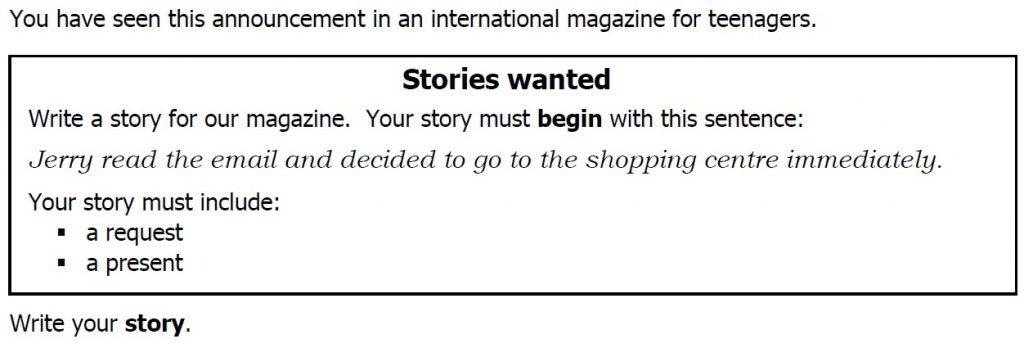
At first sight, this could be like any other task for an article or a review, but we need to look a little bit more closely to see what is unique about stories.
As always, you should go through task analysis step by step and ask yourself a few specific questions that will help you get all the information you need.
- What is the topic of my story?
- What exactly do I have to include in the story?
- Who is going to read my story?
The first question is fairly straightforward and can always be found by looking at the sentence given in the task.
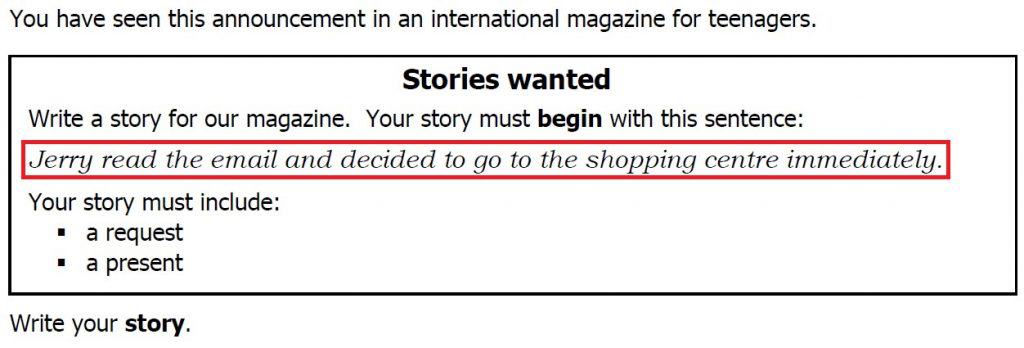
In our example, the story needs to be about someone named Jerry you received an email and decided to go to the local shopping centre. All we get is a name a a little bit of a kickstart to the plot, but that’s it.
Every story task looks similar so always focus on the given sentence to find out more about the topic.
The second question is more specific and goes into more detail. Again, let’s see what we can extract from our example task.
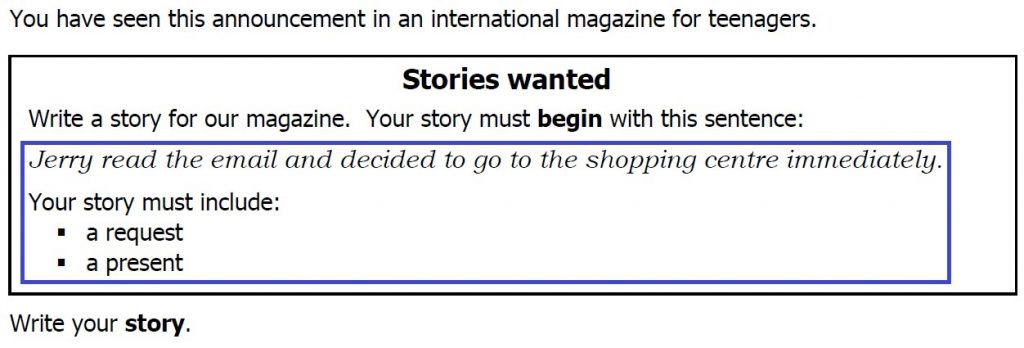
The very first thing we have to include is the sentence about Jerry and the email. There is always a sentence which must be used as the very first sentence of your story. Don’t forget or change the sentence. Start your story with it as it is.
There are, however, two more ideas that you always have to write into your story. In this case, we must include a request and a present. The role these things play in your story is entirely up to you, but they should play a central role and be important parts of the plot.
The third and final question looks at the reader of the story. Remember that you never write for the examiner or your teacher but always for someone specified in the task.
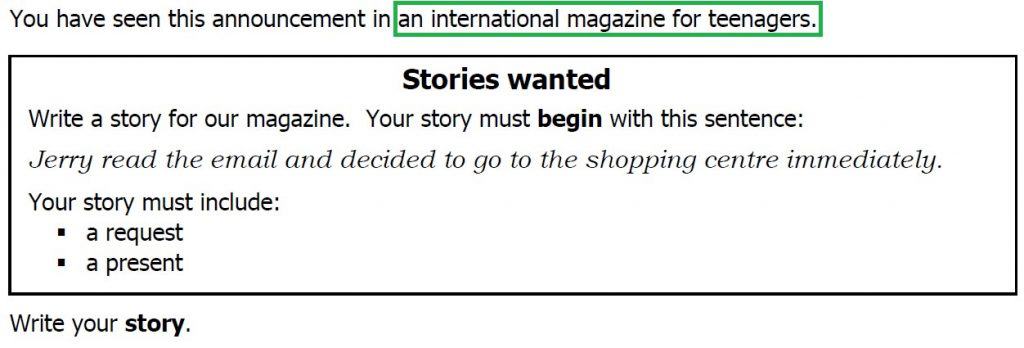
Here, we write for the readers of an international magazine for teenagers, which means that teenagers from different countries are going to read your story.
As B2 First for Schools is designed to cater to people in that age group so we are writing for peers. Therefore, we can use rather informal language, but as you will see later on, register is not the most important aspect of a story compared to, for example a letter of application where a formal style is one of the key features. Stories already include so much useful language that choosing the correct register is secondary.
Remember, every story task looks similar and you can go to the same places in each task to find key pieces of information that you can use to set yourself up for success . Simply ask yourself the three questions described in this part and you shouldn’t have a problem with task analysis.
Get Your Free B2 First Writing Cheat Sheet Now!
Just leave your name and email address below.
Please check your email inbox and spam folder for your free PDF.
How to organise a story in B2 First for Schools
When we try to put our story in a well-organised structure, we can simply look at every story ever written in the history of humankind and we will find that 99% of them look like this:
This pattern can be further broken down by splitting the main part into two or even three paragraphs, but we’ll get to that in a second. First, keep the above structure in mind for the future.
At the beginning of a story, we are usually introduced to the main character(s) and learn a little bit about the background of the plot. We might also find out about how the main character(s) feel right before the action starts.
The main part includes the main actions and parts of the plot. Here, the story progresses the furthest, but we normally don’t come to a conclusion yet.
The ending does what the name suggests. It brings the plot to a conclusion and ends the story in an appropriate and satisfying way. You don’t want to keep your readers guessing too much because there won’t be a sequel. You are not writing The Avengers Part 87 but a standalone story.
Now, however, let’s go back and see how we can apply all of the above to our specific task.
Luckily, the first sentence is already there for you, but we obviously need to be a little bit more creative. Think about how Jerry might have felt in this situation and what might have happened in the lead up to him reading the email.
I usually like to introduce the two topic points in the main part of the story, but they could already appear in the beginning. Again, this is completely up to you, which makes stories exciting and stressful to write at the same time.
Either way, in order to fill the main part of your story with life, try to come up with ideas of what could have happened on Jerry’s way to the shopping centre and when he was there.
Finally, we need to bring everything together in a good ending. You can try to end the story in an unexpected or funny way, but it is definitely more important to come to a meaningful and logical ending at all.
I find it quite often with my own students that they simply cut off the plot at the end of the main part, which leaves the reader not fully informed. So, make the reader (and examiner) happy and give your story the ending it deserves.
Always make a plan for your story
If I could give my students just one piece of advice for the writing exam in B2 First, I would tell them to always make a plan before starting to write.
It only takes a few minutes, but can save you a lot more towards the end on the test when you are in time trouble and don’t know what to do.
A plan helps you stay on task and all you have to do is follow it and fill the page with life.
My plan for our example looks like this:
- Beginning: nervous; hadn’t slept well; request in the email –> buy milk for grandma
- Main paragraph 1: flat tyre; had to change it; wasted time
- Main paragraph 2: at the shopping centre; accident with family; little girl gave him piece of paper
- Ending: piece of paper was scratchcard; won €50,000
Just from my plan, you can already guess what the story will look like even though I didn’t add a lot of information. Making the plan took me three minutes, but I only need to connect the dots now and get started.
The different parts of a story in B2 First
In this part, I’m going to take you deep down the rabbit hole. We are going to go through the different parts of a great story with the help of our example task.
You will learn more about good content as well as useful language in each part.
As I mentioned earlier, the beginning of a story fulfills two tasks. It introduces the reader to the main character(s) and sets the scene. We can include previous events and background information so we can started.
One of the main criteria in a story is the correct use of narrative verb forms . These are different past verb forms, each of which has a distinct function in a story. We want to use past simple for the main events, past continuous for background actions and past perfect simple and continuous for things that happened before the main events.
Sounds complicated, but with some practice you’ll get better at it. If the names of these verb forms don’t ring a bell at all, you should definitely look into them as they are not only important in the writing test but also in Reading & Use of English and Speaking .
In addition to this particular grammar point, we want to make the beginning interesting from the get-go using some engaging adjectives/adverbs and other helpful expressions.
A day to forget – a day to remember Jerry read the email and decided to go to the shopping centre immediately. He hadn’t slept well at all and was feeling quite nervous that morning and he didn’t want to let his grandma’s wish to buy some milk ruin his day .
I gave my story a nice title. Every good story has a title so yours should have one as well, but don’t worry too much. It can be short and doesn’t have to be anything amazing. Just make sure that you include it.
I also used a mix of verb forms ( blue ) to show the main events, background actions and things that had happened before the main storyline.
On top of that, I included a few adjectives and adverbs which help make the story come to life ( red ).
Keep these things in mind when you start your story and you will be off to a good start.
The main part of a story is what the name says: the most important part which includes the majority of information.
Here we find most of the main events and the plot progresses between the beginning and ending.
Your focus in this part should lie on a logical order of events while keeping the reader engaged and interested.
We achieve this, once again, by using the correct verb forms (mostly past simple as we are in the middle of the main events) as well as other stylistic features, some of which we’ve discussed earlier and others that you can see in the example paragraphs below.
He dragged himself into his old and dirty car and set off in the direction of Central Mall. Not even ten minutes later , he had a flat tire so he spent the next hour putting on the spare before he was able to continue his dreadful journey. At the shopping centre , he walked absent-mindedly into a family and their son fell on his knee. “I’m sorry,” was the only thing he could say, but the boy’s little sister replied , “This is a gift for you,” with a smile and gave him a crumpled piece of paper. Jerry simply stuffed it in his jacket pocket and stormed off as quickly as he could .
We’ve got quite a lot to unpack here.
First and foremost, if you take a step back and read the paragraphs without paying attention to all the colourful stuff, you will see that there is a logical and chronological progression. Jerry leaves his house, has a flat tyre, makes it to the shopping mall and runs into the family. The girls gives him the paper and he leaves.
I guess this all makes sense, but I still used certain expressions of place and time ( orange ) that support this idea that there is a sequence of events. Little remarks like ‘before’ or ‘next’ can make it so much easier for the reader to follow the story so make sure you use them.
Another feature that we haven’t discussed yet is direct speech ( green ). By using direct speech we can bring the characters to life and the reader can identify with them more easily.
Finally, I continued with good and engaging past verb forms ( blue ) as well as adjectives/adverbs ( red ) which bring colour to the things and people you describe.
The very last part of every amazing story is a great ending. Here, we tie everything together and bring the events to a conclusion.
It is your decision if you want to give your story a happy ending or not, but make sure that it ends in some way. Don’t just stop after the main part and leave your reader with questions. Send them off with a smile on their face or tears in their eyes.
Back at home , he just wanted to go to bed, when he dropped the girl’s paper on the floor. Jerry couldn’t believe his eyes . It was a scratch card with a win of €50,000 ! “Not such a bad day after all,” Jerry thought with a smile and he poured himself a steaming cup of coffee.
I tried to bring a little surprise to the ending of my story and turn Jerry’s terrible day into a good one.
You can find the different stylistic features I used in different colours again. Past verb forms are blue , direct speech green , expressions of place and time orange and other interesting language and punctuation red .
Don’t stop being awesome towards the end of your story. Stay consistent and use good language throughout the whole text. That’s what the examiners want to see and that’s you you will give them if you follow the tips in this article.
Useful language for stories in B2 First
In the last part, I showed you some of the main ideas to improve your story writing. Using these language features can give you an edge over other candidates and impress your examiner. Always remember that an examiner checks dozens of texts per day and it is important to stand out with your pieces of writing.
So, below I’ve listed the different types of useful language with a few examples in each category. Obviously, this is not a complete list, but you can add expressions and adjust them to your needs.
How your B2 First story is marked
The process of marking candidates’ writing tasks in B2 First is an involved and quite complicated process. There are different criteria the examiners have to look at and even for teachers, it can be almost overwhelming to work their way through all the information.
I wrote an article on the topic that I hope will help students and teachers alike to better understand the marking process and to use it in order to improve their writing and/or teaching skills and insight.
Simply click here to find out more.
Time to become a storyteller
In this article, I’ve shared with you everything I know about how to write an excellent story in B2 First for Schools.
Take my advice and start practising. If you have any questions or problems, feel free to leave a comment and I will reply as quickly as I can.
Lots of love,
Teacher Phill 🙂
Similar Posts

Cambridge B2 First (FCE) vs. C1 Advanced (CAE)
B2 First (FCE) vs. C1 Advanced (CAE) Cambridge B2 First (formerly known as FCE) and C1 Advanced (CAE) are two…

The 25 most common mistakes in the FCE exam (and how you can avoid them)
Offence wins games, but defence wins championships The FCE exam is one of the most important language exams in the…

Cambridge B2 First (FCE): Reading & Use of English Part 7
Reading & Use of English Part 7 If you are looking for the best information you can get about Reading…

Cambridge B2 First (FCE): Writing
Writing One of the most unpopular things to do in an English class is to do a writing task. You…
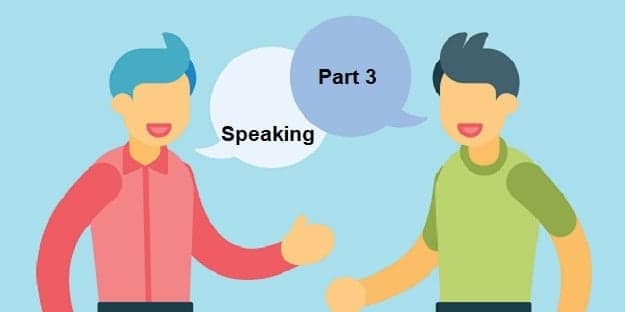
Cambridge B2 First (FCE): Speaking Part 3
Introduction The FCE Speaking paper is one of the more interesting exams compared to others like IELTS. In the FCE…

Cambridge B2 First (FCE): How to Write an Email/Letter
Get Your Free B2 First Writing Cheat Sheet Now! Just leave your name and email address below. Yes, I want…
I am in fact glad to read this weblog posts which consists of lots of useful facts, thanks for providing such data.
Thanks a lot! Best explanatatory article I’ve read about writing a story. I’ll definitely check your other guides. Love the coloring and comments to each part!
Thank you so much!!! This is excellent…easily explained…everything included A must to have when teaching…FCE!!
Comments are closed.

Cambridge B2 First (FCE) Exam Topics

Environment

Food and Drink

Feelings and Emotions

Health and Fitness

Leisure Activities


COMMENTS
• Learn useful techniques for planning your own essay. • Evaluate two examples of a Writing Part 1 essay. • Practise and evaluate your own answer to a Writing Part 1 task. Review: Writing Part 1 . The B2 First for Schools Writing paper has two parts. Part 1 has only one task, which you . must. answer. You will: be given the essay title.
Article navigation: B2 First (FCE) Essay: Example Topics / Questions B2 First (FCE) Essay: Download (PDF) An essay is a piece of writing in which you are asked to discuss a topic that might be controversial or relevant somehow. It usually follows a class discussion. The language of an English essay should be formal.Also, make sure that you justify all your ideas and that you use appropriate ...
FCE Essays - Sample/model answers and examiner comments. An essay is always written for the teacher. It should answer the question given by addressing both content points and providinga new content point of the writer's own. The essay should be well organised, with an introduction and an appropriate conclusion,and should be written in an appropriate register and tone
Once you've got a structure that works, rinse and repeat with different topics until you can consistently produce a well-polished text. The materials. Here are three First (FCE) essay questions. They have been designed using typical FCE essay topics for B2 level. Use them to practise and improve in preparation for the Cambridge B2 First exam ...
B2 First Writing Part 1 . Teacher's notes . Aims of the lesson . to familiarise students with Part 1 of the Writing paper and give them practice at planning an essay . Time needed . 50 minutes . ... Is everything about the topic? 4. Language : D. Does the candidate get his/her
B2 First (FCE) Essay: Example essays B2 First (FCE) Essay: Example topics B2 First (FCE) Essay: Tips B2 First (FCE) Essay: FAQ B2 First (FCE) Essay: Useful Phrases & Expressions. The essay is a compulsory task to be completed in Part 1 of the writing section in the Cambridge B2 First (FCE) that is written to convince someone of something or to ...
Cambridge First (FCE) Writing part 1 (essay) Difficulty level: B2 /Upper Intermediate. Write 140-190 words in an appropriate style. In your English class you have been talking about old people in society. Now your English teacher has asked you to write an essay.
The first part is the essay; the second part is an article, email, letter, report, or review. You will be given the essay title and two ideas or prompts. It's essential that you include both of these ideas in your essay, as well as another relevant idea that you have to come up with yourself. You have to write 140-190 words in each part and ...
Part 1 of the writing test - there are 2 parts total. 140-190 word limit. You have about 40 minutes to plan and write your essay. You must answer a question using two notes and your own idea. The topic requires general knowledge only. The essay is always formal because it is written "for your teacher".
EXAM PART: First (FCE) Writing Part 1 - Essay. EXAM SKILLS: Improving content and communicative achievement in essay writing. TOPIC: Lifestyle (living in the city vs living in the countryside) TIME: 30 minutes + 45 minutes writing (in-class or for homework) PREPARATION: One copy of the worksheet per student.
These three paragraphs are called the body of the essay. However, an essay wouldn't be an essay without an introduction at the beginning and a conclusion at the end. All together that's five paragraphs and we could structure it like this: With an introduction, body and conclusion every essay has three main parts.
Cambridge English: B2 First (FCE) Writing. Difficulty level: B2 /Upper Intermediate. What is the B2 First (FCE) Writing test like? The test has two sections and takes about 80 minutes: Part 1-write an essay based on prompts; Part 2 - write one from a choice of 3 questions: an article, an essay, a letter, a report, a review, a story; Scoring
On-the-go practice with Test & Train. Test & Train is an easy-to-use practice tool to help you get ready for your B2 First exam through short, sharp workouts. With over 300 practice questions, you can use it anytime, anywhere and as many times as your like! Get started today.
Test 1 / 25. Answer the question below. Write 140 - 190 words in an appropriate style. Your teacher has asked you to write an essay on the dangers of social media, and how people can protect themselves. Do you think social media can be dangerous? Write your essay using all the notes.
First (FCE) Breakout English has a number of First (FCE) materials for you to use in class or at home to prepare for the Cambridge B2 exam. The Cambridge First exam is a big step up from B1 level exams. At B2, Cambridge introduces the Use of English section while also increasing the challenge of several other task types in the Reading, Writing ...
Cambridge B2 First (FCE) - Writing. The B2 First Writing test has a duration of 1 hour 20 minutes and consists of two parts, and it accounts for 20% of the total score.. The first part has one compulsory question. In the second part, there are three questions, and you must choose one.. Candidates are required to write an essay of about 140-190 words in each part.
An essay is usually written for a teacher and may be written as a follow up to a class activity. It should be well-organised, with an introduction, clear development and an appropri ate conclusion. The main purpose of this task is the development of an argument and/or discussion of issues surrounding a certain topic.
B2 First Writing Part One essays useful phrases brainstorming and key words. Write at least two or three useful phrases for doing each of these things in Cambridge First essays: Introduction Background to the topic (why it is important etc) Explaining the structure of your essay. Introduction/ Body Giving strong opinions.
Step Two: Write it (25 minutes) An interesting introduction is the key to a first-rate article. You want to capture your audience's attention whilst making it clear what it's going to be about. Start with an opening line that sets the tone of the topic. Try to catch the attention from the first word.
Beginning: nervous; hadn't slept well; request in the email -> buy milk for grandma. Main paragraph 1: flat tyre; had to change it; wasted time. Main paragraph 2: at the shopping centre; accident with family; little girl gave him piece of paper. Ending: piece of paper was scratchcard; won €50,000.
Cambridge B2 First (FCE) Exam Topics. General. General exercises, lessons and questions that cover a wide range of topics and are not focused on any one individual... view lessons. Food and Drink. Food and drink is a topic that sometimes comes up in the B2 First exam, usually when referring to healthy... view lessons.
The new Cambridge English: First Writing task The Cambridge English: First for Schools task is similar but the subject of the essay will reflect the younger candidates taking the exam. In the new exam specification for 2015 there is a new Writing task. The compulsory part 1 question is now an essay rather than an email or letter.
C1 Advanced (CAE) Essay: Download (PDF) An essay is the first part of the C1 advanced writing and it is obligatory. You need to answer the question with between 220-260 words. In the text, you need to analyse a question using different points of view. It is a semi-formal/formal text and should be impartial until the conclusion.